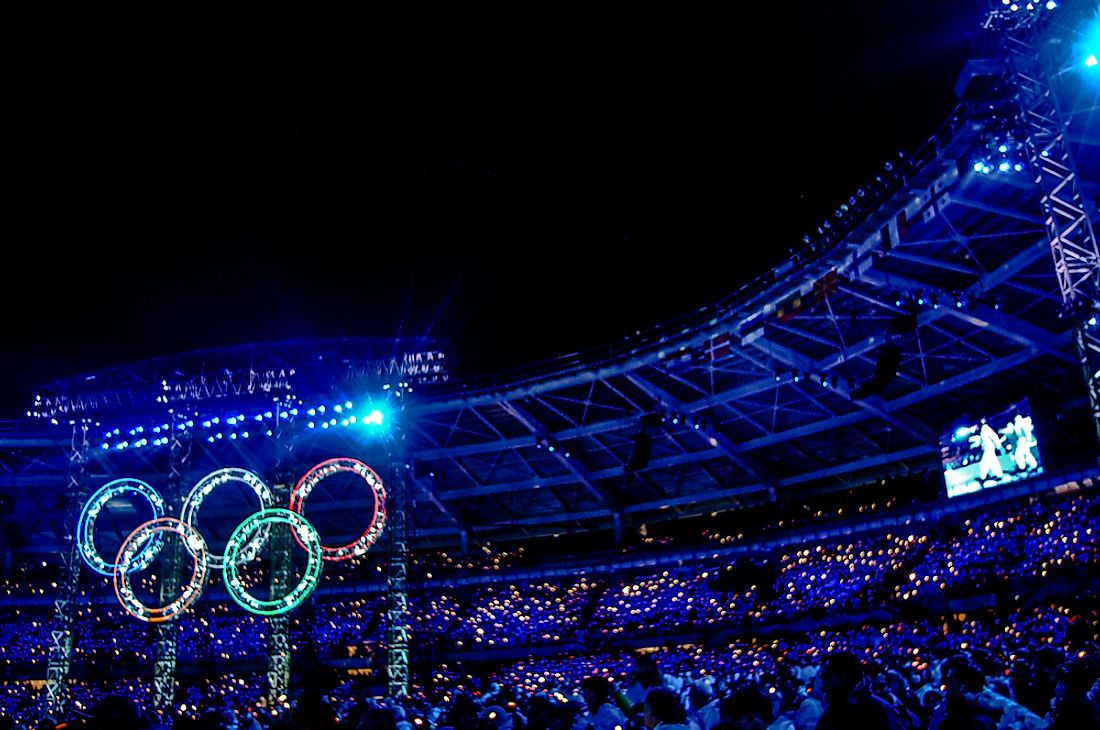How Many Countries Compete in the Olympics?

The Olympics has now become the most popular international multi-sport event in human history, but how and why has this happened? There is no single definitive reason for this, but there are a number of different factors that have influenced the popularity of the Games. The Olympics history harkens back to the days of classical Western civilization, as an event from the bygone past of human history. There is also the history the modern day version of the Olympics brings up with classic moments, controversial events and athletes and athletic feats that will always be remembered. The Olympics also brings a sense of nationalism and national pride in rooting for the athletes representing your country.
Starting with the post-World War II years, the Olympics has also gained full global prominence due to the rise of the standard of living globally, which has helped most of the world to experience global communication technologies like radio, television and the internet. This improved means of communication has caused much of the world to be able to tune in and experience the Olympics from wherever they are, making it a global viewing experience.
Evolution Of Participation In The Olympics Over The Years
The Early History Of The Summer Olympics
In 1894, the International Olympic Committee (IOC), the governing body of the Olympics, was founded by Baron Pierre de Coubertin. He was inspired by the ancient Grecian Olympic games and based his Olympics off of the Wenlock Olympian Society Annual Games. In 1896 the first Olympics kicked off in Athens to great success. There were around 245 athletes from 14 nations competing, though most of them were from Greece. In 1900, the Olympics moved to Paris, where about 997 athletes from 24 countries competed. This Olympics was the first time women participated in the event, with 22 competing in select sports. In 1904 the Olympic was hosted in St. Louis, but the number of nations and athletes competing fell to 12 countries and about 651 athletes. This decrease in participant numbers was due to the lengthy transatlantic boat ride needed to be made by the European competitors to attend the Games.
The 1900 and 1904 Olympics were integrated with the World Fairs, which stretched out the events over months. This fact caused the Olympics to be more homogeneous, which hurt participation and the Olympic brand. In 1906 the Intercalated Games were held in Athens. At the time of the event, it was seen as an official Olympic event. It is now not recognized by the IOC but is recognized as an Olympic event by most historians. This Game did attract great public interest and once again gave the game its own venue to be recognized. The Intercalated game was a springboard for the rise of participation in the Olympics since the 1908 London games attracted about 2,000 athletes, more than the first three Olympics combined.
Increase In Olympic Participation
Since the 1908 Olympics, every Olympics has had over 2,000 athletes compete, except the 1932 games. Since 1960 every Olympics has had over 5,000 athletes compete and since 1996 every Olympics has had over 10,000 athletes compete. Since 1948 every Olympics has had over 50 nations compete and since 1984 every Olympics has had over 100 nations compete. The two main reasons for the massive increase in athlete and nation participation in the Games are due to modern transportation and decolonization. Following the end of World War Two, commercial air flight became the popular way and fastest to travel around the global. Athletes from anywhere can hop on an airplane to go to the host country in less than a day, as opposed the month long boat rides of the past. The rise in the countries competing in the Olympics has also to do with decolonization that briefly started during the interwar years and then took off in the decades following World War Two. This decolonization caused many new nations, especially in Africa and Asia, to come into independence and be able to compete in the Olympics.
Cancelled Olympics Games
In 1916 the Olympics were supposed to have been held in Berlin, Germany. Even after the outbreak of World War One on July 28, 1914, the organization of the Games continued as the war was expected to be a short one. The games were eventually canceled once the war dragged on and everyone realized it would not be a short war. The 1940 Olympics was to be held in Tokyo, Japan but was canceled after the Second Sino-Japanese War started and Japan ceased working on the Olympics. The 1940 Olympics was then given to the runner up, Helsinki, Finland. This event too was canceled due to the start of the Winter War between the Soviet Union and Finland, three months into the outbreak of the World War Two. The 1944 Olympics was canceled indefinitely shortly after the outbreak of World War Two.
Major Boycotts At The Olympics
In 1976 there was a massive boycott of the Olympics over the IOC's decision not to ban New Zealand's rugby team from the Olympics. New Zealand's rugby team had gone on a controversial tour of apartheid South Africa that summer, which defied an informal but widely enforced international athletics embargo on South Africa. Almost all of sovereign Africa boycotted the Games, and they were joined by Iraq and Guyana. Taiwan and China boycotted the games in a separate dispute over the name issue between them.
In 1979, after the Soviet Union invaded Afghanistan, the United States threatened to withdraw from the 1980 Olympics if the Soviets did not leave Afghanistan. The United States, Japan, West Germany, China, Argentina, Canada, Iran and many other countries boycotted the Olympics over the Afghanistan issue. In total 65 countries boycotted the games, either because of the boycott or economic reasons. In 1984 as a response to security concerns and anti-Soviet hysteria, the Soviet Union, and its allies boycotted the Los Angeles Olympics. The boycott was the Soviet Union and its Eastern Bloc, as well as South Yemen, Mongolia, Ethiopia, Vietnam, Laos, Cuba, North Korea, and Angola.
How the Olympics Promotes Good Relations Between Countries
The participation of so many countries helped to promote good relations between countries.With so many people from around the world at the Olympics and all of the athletes interacting with each other at the Olympic Village helps to show so many people that everyone is human and that our differences do not matter. The Olympics helps to show the value that intentional friendship and cooperation can bring and helps to promote peaceful international relations among people from around the globe.
Olympic Games Over The Years: Number Of Participating Countries
| Rank | Year | Number of Participating Countries |
|---|---|---|
| 1 | 2016 | 208 |
| 2 | 2012 | 204 |
| 3 | 2008 | 204 |
| 4 | 2004 | 201 |
| 5 | 2000 | 200 |
| 6 | 1996 | 197 |
| 7 | 1992 | 169 |
| 8 | 1988 | 159 |
| 9 | 1984 | 140 |
| 10 | 1972 | 121 |
| 11 | 1968 | 112 |
| 12 | 1964 | 93 |
| 13 | 1976 | 92 |
| 14 | 1960 | 83 |
| 15 | 1980 | 80 |
| 16 | 1952 | 69 |
| 17 | 1956 | 67 |
| 18 | 1948 | 59 |
| 19 | 1936 | 49 |
| 20 | 1932 | 47 |
| 21 | 1928 | 46 |
| 22 | 1924 | 45 |
| 23 | 1920 | 29 |
| 24 | 1912 | 29 |
| 25 | 1900 | 29 |
| 26 | 1908 | 22 |
| 27 | 1906 | 21 |
| 28 | 1904 | 15 |
| 29 | 1896 | 12 |











